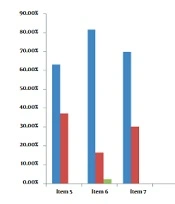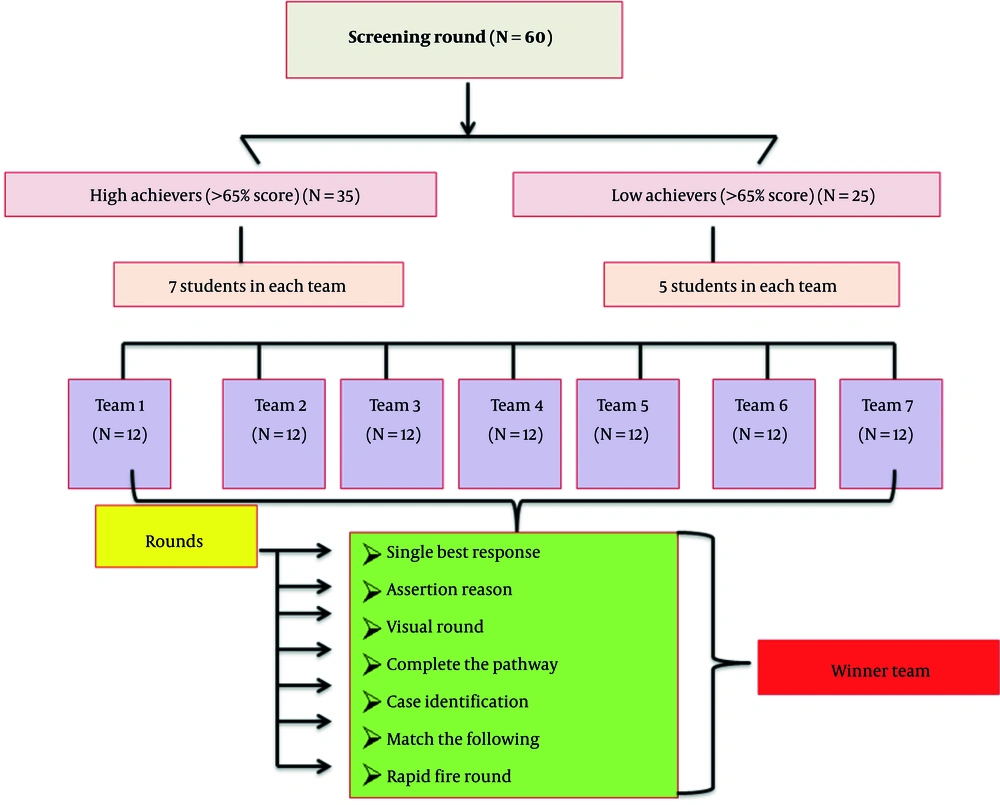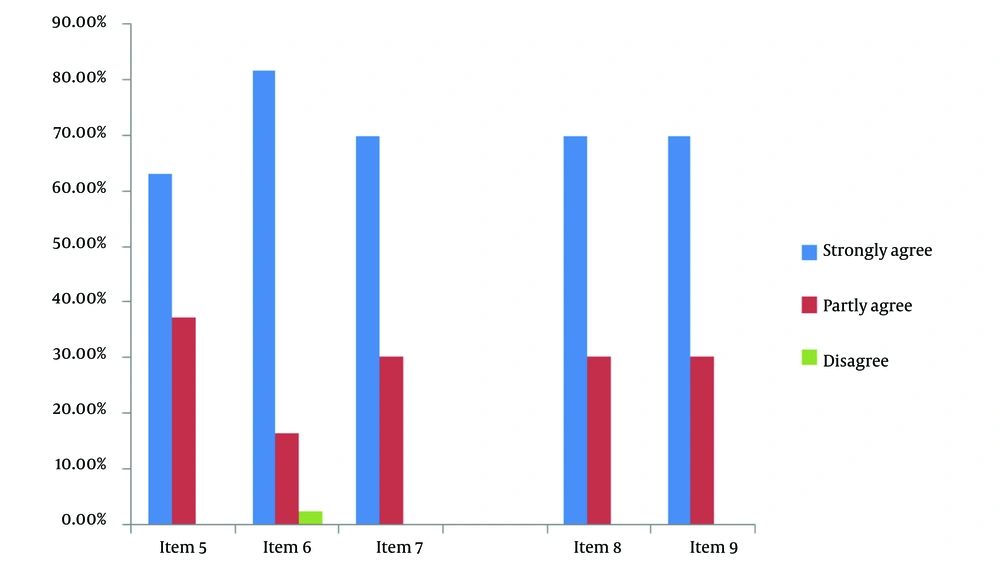1. Background
According to the Medical Council of India, under "Regulations on Medical Education, 1997,"Medical Education has scope for trying innovative approaches for teaching and learning. It is observed that lectures alone do not seem adequate as a coaching technique, and it is a poor method of transferring or acquiring information, even less effective in skill development and generating the right attitudes. There is a need to ensure that every effort should be made to encourage the employment of active teaching methods (1). In order to make medical subjects interesting, it is necessary to experiment with innovative teaching and learning methods. A quiz is one of the techniques among such various methods (2).
In medical teaching, facilitators meet challenges in presenting various difficult academic subjects, which consist of a considerable amount of material that needs to be learned by students in a relatively short period of time. Traditional lectures are easy for the teachers but do not always seem to be the most effective educational method for bulk medical students. This can be made possible by bringing essential changes by introducing innovative techniques through which teachers can provide a student-centered learning environment that may make the learning process interesting and understandable to young learners (3). The quiz may be a good tool not only to extend the attention and interest within the topic but also to assess the knowledge within the applied aspects of clinical biochemistry.
2. Objectives
We aimed to determine the effectiveness of the quiz as a teaching-learning method to make Biochemistry an interesting subject for MBBS students.
The objectives were to:
Sensitize the students regarding quizzes in biochemistry.
Assess the quiz's effectiveness in students' understanding of the subject.
Obtain the learning gain after conducting the quiz.
Obtain the perception of the students regarding the function of the quiz.
3. Methods
It is an observational study. A quiz was conducted by the Department of Biochemistry at Rajiv Gandhi Medical College, Kalwa, Thane, in July 2018. Ethical approval was obtained from the Institutional Ethics Committee (RGMC/CSMH/IEC/A/2018/06/68 dated 19/06/2018). We enrolled 60 students of first-year MBBS batch 2017 - 18 as study participants after obtaining informed consent. There were 38 male and 22 female students in the age group of 17 - 20 years.
Inclusion criteria included all girls and boys of the first-year MBBS batch 2017 - 18. Exclusion criteria included students not belonging to the MBBS batch 2017 - 18.
The students were informed 20 days before the competition. After obtaining students' written informed consent, the quiz was conducted in two sessions: A screening round and the main quiz.
The screening exam consisted of sections like multiple choice questions, fill-in-the-blanks, true/false, and case scenarios. After the screening round, the students were divided into two groups, high achievers and low achievers, based on the score obtained in the screening exam [> 65% score: High achievers (n = 35) and < 65% score: Low achievers (n = 25)]. The students were divided equally into five teams of seven students from the high achiever group and five students from the low achiever group. In this way, the whole batch of 60 students was divided into five teams of 12 students. The quiz was conducted on PowerPoint presentations. On the day of the main quiz, two students from each team were selected randomly as quizzers for each round, as we had seven rounds in the quiz. For the last round (rapid fire), the students decided who will be the quizzers in their team. In this way, each student had the opportunity to be part of the competition and contribute to the team.
Confidentiality was maintained at all times. A pretest questionnaire in the form of an MCQ test was taken before the quiz. To evaluate views about the quiz, feedback was elicited from the students. For each round of the quiz, students from each group other than the quizzers formed the audience. The question not answered by a particular team was not to be passed to the next team; instead, it was asked to the audience from the same group. If they failed to answer it again, it would be passed to the other team's audience, whoever wished to answer; if not answered, then the quiz master would answer. There were no negative marks for wrong answers. The decision of the quiz master was considered final in deciding the correct answer and awarding marks. The cumulative scores of all the rounds were calculated to decide the winning team. An extra round was prepared in case of a tie between the teams. At the end of the quiz, suitable prizes were given to the winning team and the audience. There were seven rounds: (1) single best response, (2) assertion reason, (3) visual round, (4) complete the pathway, (5) case identification, (6) match the following, and (7) rapid fire round, as shown in Figure 1.
3.1. Data Analysis Tools
Data were analyzed using the Statistical Package in Microsoft Excel. Close-ended items of the feedback questionnaire to evaluate students' perceptions were analyzed by quantitative analysis using a five-point Likert scale as the percentage and mean scores. Pretest and post-test scores were analyzed using the student t-test, mean, and standard deviation (SD). The P-value < 0.05 was considered significant. The judges and the quiz master were blinded, as they were not involved in the process of framing questions and rounds of the quiz.
4. Results
In this study, 57 out of 60 students were present on quiz day; the attendance rate was 95%. Other students from the same team covered the absentees. Table 1 shows that the mean pretest score was 36.6%, i.e., 7.32 ± 1.47 out of 20, whereas the mean posttest score was 87.3%, i.e., 17.46 ± 2.4 out of 20. As shown in Figure 2, in the feedback questionnaire, students were also asked about the round they liked the most, for which 70% of the students voted for the rapid fire round, 20% chose case identification, whereas 10% said all the rounds were equally good. Also, 52% of the students felt that teachers could improve their teaching skills through such activities. Moreover, 70% of the students felt they had an excellent experience through the quiz, and such activities should be conducted more often. Besides, 62.8% of the students strongly felt that the quiz improved their understanding of the subject, whereas 37.2% agreed with it. Indeed, 81.4 % of the students strongly agreed with the idea of the quiz as a tool for improving critical thinking toward the subject. However, 2.3% of the students felt it would not be effective for developing critical thinking. Also, 69.8% of the students strongly agreed with the idea of the quiz as an effective tool for self-assessment and active learning. They also strongly felt that activities like a quiz could help improve students' performance in the examination, as shown in Table 2.
| Number of Students Present | Pretest (Score Out of 20) | Posttest (Score Out of 20) | P-Value |
|---|---|---|---|
| 57 (out of 60) | 7.32 ± 1.47 | 17.46 ± 2.4 | < 0.0001 |
a Values are expressed as mean ± SD.
| Items | Excellent | Good | Average | Poor |
|---|---|---|---|---|
| 1. How was the overall conduction of the quiz? | 55 | 42.5 | 2.5 | 0 |
| 2. What about the rounds chosen for the quiz? | 46.6 | 48.8 | 4.6 | 0 |
| 3. What is your opinion about the quality of the questions? | 44.2 | 53.5 | 2.3 | 0 |
| 4. How would you rate the quiz? | 54 | 46 | 0 | 0 |
| Analysis based on the Likert scale | Strongly Agree (3) | Partly Agree (2) | Disagree (1) | |
| 5. Do you feel the quiz helped you gain a deep understanding of the topic content? | 62.8 | 37.2 | 0 | |
| 6. Do you feel the quiz was helpful for students in improving their critical thinking? | 81.4 | 16.3 | 2.3 | |
| 7. Do you feel self-assessment can be achieved more effectively by the quiz? | 69.8 | 30.2 | 0 | |
| 8. Do you feel active learning can be promoted among students effectively by such activity? | 69.8 | 30.2 | 0 | |
| 9. Do you feel the quiz can help improve students' performance in the examination? | 69.8 | 30.2 | 0 |
a Values are expressed as %.
5. Discussion
In today's generation, it is tough for teachers to keep students' interest alive while teaching the subject, especially among medical students.
A teacher can use an interactive approach to teach a large group with many objectives, such as making the teaching senseful, reflective learning, evaluation of students’ experiences, and setting the future learning objectives. When a teacher teaches with these objectives, the students are encouraged to analyze about their methods of learning, problem identification, its possible solution, and expression of their views (4).
Therefore, quiz competitions based on curricular subjects, if conducted in a fun way, can be a very effective tool to motivate the students to increase their interest in the subject, and at the same time, enhanced learning can be established among the students.
Similar studies by Barthakur et al. (5), Gudadappanavar et al. (6), Mahajan et al. (7), Devi (8, 9), Khan et al. (10), and Begum et al. (11) have stated that the quiz-based teaching-learning process is more interactive (6). It can help students perform better (7). Quiz-based teaching is much more encouraging and effective than traditional lectures (8). Students also find it an interesting and useful learning tool, and overall satisfaction was good among students and faculties (9-11).
5.1. Limitation of the Study
The study was conducted based on the complete course of biochemistry, and participants, being only 60 students in this study, need more studies where topic-wise quizzes are conducted among a large group of students. The quiz should include more rounds to assess skills and effective domains. However, it is a time-consuming exercise that needs interested faculty. Every subject needs to conduct such activities to make respective subjects easy to understand and interesting.
5.2. Conclusions
For first-year MBBS students, making the subject of biochemistry engaging and interesting is a pretty tricky task for medical teachers. The students were sensitized and exposed to a biochemistry quiz in this study. They could understand the subject topics through this activity. Moreover, the quiz improved their scores. In addition, we could understand students' perceptions since most students responded positively to the quiz as a tool to improve their understanding of the subject, active learning, critical thinking, and performance in their exams. If we put students in a competitive mode, they actively take an interest and participate. Hence, such innovative teaching-learning techniques can make educators achieve their goal, making students independent learners and empowering them with new learning methods that they find enjoyable. More such interactive and innovative teaching methods should be introduced and practiced regularly to keep the active involvement of students in the respective subject. This can be achieved by involving more faculties in quiz activities and making it a regular practice to boost students' performance in all subjects.


